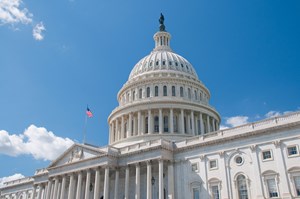July 2020 Vol. 75 No. 7
Washington Watch
Senate Water Infrastructure Bills Pass Committee
By Stephen Barlas, Contributing Editor, Washington, D.C.
The Senate is well on its way to passing two bi-partisan bills with funds for sewer and drinking water infrastructure. The bills passed by the Senate Environment and Public Works Committee increase authorization levels for the Environmental Protection Agency’s (EPA) Clean Water (CW) and Drinking Water (DW) State Revolving Funds (SRFs). But those are only ceilings for annual funding; the Appropriations Committees in both houses actually determine funding in fiscal year 2021, which begins Oct. 1, 2020, and beyond.
The America’s Water Infrastructure Act of 2020 (AWIA 2020) and the Drinking Water Infrastructure Act of 2020 (DWIA 2020) don’t make significant, programmatic changes in either SRF program, nor in the Water Infrastructure Finance and Innovation Act program (WIFIA), which is covered by AWIA 2020. That fairly new EPA program is authorized (again, not appropriated) at $50 million a year for
each of FY 2022, FY 2023 and FY 2024.
The WIFIA is a federal credit program for water construction or maintenance projects with price tags above $20 million.
AWIA 2020 would authorize the CWSRF program in the amounts of $2 billion for FY 2022, $2.5 billion in FY 2023 and $3 billion in FY 2024, significantly larger than recent appropriated amounts. DWIA 2020 provides approximately $2.5 billion in federal authorizations for drinking water infrastructure, including $1.9 billion in fiscal 2021 for the DWSRF. The bill also establishes a couple of new grant programs, each at $50 million per year.
Tommy Holmes, legislative director for the American Water Works Association, points out that while the two new programs will not dramatically impact the nation’s water infrastructure needs, they will certainly help those communities selected to address their water needs.
“Our bigger concerns now are in the impacts of the coronavirus pandemic on water systems,” Holmes added. “There is a need to help low-income customers pay their water bills, a need to help water utilities that have seen dramatic reductions in revenue, and a need to invest in water infrastructure more dramatically to create jobs and upgrade water services.”
House Democrats passed the HEROES Act (H.R. 6800), which contains $1.5 billion in “low-income household drinking water and wastewater assistance.” The funds would go to owners or operators of public water systems or treatment works to reduce rates charged to households qualifying as “low income” in one of two ways:
- all households with income equal to or less than 150 percent of the Federal poverty line
- all households with income equal to or less than 60 percent of the state median income
However, the HEROES Act has no chance of passage in the Republican-controlled Senate. Parts of that bill, including the grants to water utilities and states for reduction of rates to low-income households, might find their way into a bi-partisan coronavirus relief bill if, in fact, another emerges from Congress.





Comments